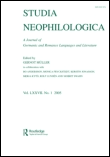
STUDIA NEOPHILOLOGICA
Scope & Guideline
Exploring the Depths of Language and Thought
Introduction
Aims and Scopes
- Philological Studies:
The journal emphasizes philological research, exploring the historical development of languages, texts, and literary traditions. - Linguistic Analysis:
A strong focus on linguistic methodologies, including corpus-based studies, pragmatics, semantics, and syntax, highlighting the evolution and structure of various languages. - Translation Studies:
Exploration of translation theories, practices, and their impact on language and culture, including eco-translatology and the role of translation in multilingual contexts. - Cultural and Historical Contexts:
Research that connects language and literature with cultural, historical, and social contexts, examining how these elements influence each other. - Intermediality and Adaptation:
An interest in the adaptation of texts across different media, analyzing how narratives transform when translated into different forms, such as film and digital platforms.
Trending and Emerging
- Interdisciplinary Approaches:
A growing trend towards interdisciplinary research that combines linguistics, cultural studies, and literary analysis, reflecting a holistic understanding of texts and language. - Corpus-Based Methodologies:
An increase in corpus-based studies, utilizing large datasets to analyze linguistic patterns and trends, demonstrating a shift towards empirical research in linguistics. - Digital Humanities:
Emerging interest in digital tools and methodologies, facilitating new forms of textual analysis and the exploration of literary works in digital formats. - Eco-Translatology:
A notable rise in research focused on eco-translatology, addressing the intersection of translation studies and environmental concerns, reflecting broader societal issues. - Pragmatics and Emotion:
An increasing focus on the relationship between language use, pragmatics, and emotional expression, indicating a trend towards understanding language in social contexts.
Declining or Waning
- Traditional Literary Criticism:
There appears to be a waning interest in conventional literary criticism that does not incorporate interdisciplinary approaches or contemporary methodologies. - Historical Linguistics:
While still present, the focus on purely historical linguistic studies has diminished in favor of more applied and contemporary linguistic analyses. - Static Translation Theories:
The journal has shifted away from static or prescriptive views of translation, moving towards more dynamic and context-sensitive approaches. - Narrowly Defined Language Studies:
Research focusing on isolated aspects of language without consideration of broader cultural or historical implications is becoming less frequent. - Regional Dialect Studies:
There is a noticeable decline in studies that focus exclusively on regional dialects, as the journal's scope expands to include more global perspectives.
Similar Journals

REVISTA DE FILOLOGIA DE LA UNIVERSIDAD DE LA LAGUNA
Fostering critical discussions in linguistics and language studies.REVISTA DE FILOLOGIA DE LA UNIVERSIDAD DE LA LAGUNA is a prestigious academic journal dedicated to advancing the fields of linguistics and language studies. Published by the Universidad de la Laguna in Spain, this journal serves as an essential resource for researchers, professionals, and students alike, offering critical insights and scholarly articles that contribute to the understanding of language and its intricacies. With its inclusion in the Q3 category of the 2023 Linguistics and Language rankings and Scopus rankings, it demonstrates a growing impact within the academic community, while maintaining a commitment to fostering dialogue and disseminating valuable research. As a platform for innovative ideas and diverse perspectives, the journal aims to bridge theoretical approaches and practical applications, ensuring that readers are well-equipped to engage with contemporary issues in linguistics. Although it is currently not open access, the journal remains an influential contributor to the language and linguistics sectors, operating from the picturesque Canary Islands, enhancing its appeal not only as a scholarly resource but also as a culturally rich platform for academic expression.

Folia Linguistica et Litteraria
Fostering Dialogue Between Linguistics and LiteratureFolia Linguistica et Litteraria, published by the University of Montenegro's Institute of Language and Literature, is an esteemed academic journal that provides a vital platform for the exploration and discourse in the fields of Linguistics and Literary Theory. With an ISSN of 1800-8542, this journal serves as a significant resource for researchers, educators, and students alike, fostering an understanding of language, literature, and their interrelationship. Having established its presence in the scholarly community, Folia Linguistica et Litteraria has been ranked in the 2023 quartiles, achieving Q3 in Linguistics and Language, and Q2 in Literature and Literary Theory, indicating its growing influence and relevance. Its Scopus rankings further underscore the journal’s commitment to high-quality research, reflecting its standing within the arts and social sciences. While the journal operates without open access, its rigorous peer-review process ensures that only the most impactful studies are published. As it converges its focus from 2019 to 2024, this journal invites contributions that challenge conventional boundaries, encouraging interdisciplinary dialogue and innovative research in the rich fields of linguistics and literary studies.

Onomazein
Charting New Territories in Linguistic ResearchOnomazein is an esteemed academic journal published by the Pontificia Universidad Catolica de Chile, Facultad de Letras, featuring a dedicated focus on the field of Linguistics and Language. With an established presence since 2011, it reaches an international audience and is recognized for its contributions within the Q2 category of Linguistics as per the latest rankings, underscoring its significance in the academic community. The journal holds a commendable position in Scopus, ranking 470th out of 1088 in Arts and Humanities and 549th out of 1167 in Social Sciences, reflecting its relevance and impact in the domain. Although it does not currently offer an open access option, Onomazein remains a critical platform for researchers, professionals, and students seeking to advance their understanding of linguistic phenomena and engage with contemporary debates in language studies. For submissions and more information, please refer to the university’s address at AV Vicuna Mackenna 4860, Santiago, Chile.

Caplletra
Advancing Open Access Scholarship in LinguisticsCaplletra is a distinguished open-access journal dedicated to the field of linguistics and language studies, published by PUBL ABADIA MONTSERRAT since its inception. Based in Barcelona, Spain, this journal has been a vital resource for researchers, professionals, and students engaged in the intricate explorations of language and its applications since its transition to open access in 2005. Despite its current quartile ranking of Q4 within the Linguistics and Language category as of 2023, Caplletra continues to serve as an inclusive platform, fostering a dialogue that encourages a diverse range of scholarly contributions. Covering an expansive scope in the converged years from 2018 to 2024, it plays a crucial role in disseminating innovative research and insights. With its ISSN 0214-8188 and E-ISSN 2386-7159, Caplletra is committed to making academic work accessible to all, enhancing the landscape of linguistic scholarship and reflecting the evolving nature of language studies.

MonTI
Catalyzing Research Excellence in Linguistics and EducationMonTI (ISSN: 1889-4178; E-ISSN: 1989-9335), published by UNIV JAUME I, stands as a pivotal journal in the domains of Education, Linguistics, and Language, based in Castellón de la Plana, Spain. With a notable impact factor reflected in its 2023 Scopus rankings—sitting in the Q1 quartile for Linguistics and Language—this journal is dedicated to advancing knowledge and research in these fields from 2014 to 2024. MonTI provides a platform for scholars and practitioners to disseminate innovative ideas and practices, ensuring open access for those interested in the intersection of language and education. Its robust ranking in arts and humanities and social sciences not only underscores its academic prestige but also emphasizes its relevance in fostering scholarly dialogue. Whether you are a researcher, educator, or student, MonTI offers rich resources and insights to enhance your understanding and practice in linguistics and education.
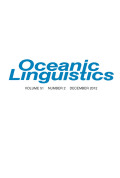
OCEANIC LINGUISTICS
Connecting Cultures Through Language ResearchOCEANIC LINGUISTICS is a premier academic journal published by UNIV HAWAII PRESS, dedicated to the study of languages spoken in the Pacific region. This esteemed journal, bearing ISSN 0029-8115 and E-ISSN 1527-9421, serves as a vital platform for linguists, researchers, and scholars to disseminate significant findings and insights related to Oceania's rich linguistic diversity. With a commendable impact factor and categorized in the Q2 Quartile for the field of linguistics and language, OCEANIC LINGUISTICS ranks 335th out of 1088 in Arts and Humanities and 395th out of 1167 in Social Sciences, reflecting its relevance and influence in ongoing linguistic discourse. The journal is a subscription-based publication, committed to advancing research and fostering scholarly communication from 2004 to 2024, making it an essential resource for anyone engaged in the study of linguistic phenomena in the Oceania region and beyond.
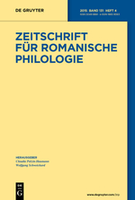
ZEITSCHRIFT FUR ROMANISCHE PHILOLOGIE
Bridging Historical Insights with Modern Literary DiscourseZEITSCHRIFT FUR ROMANISCHE PHILOLOGIE, published by Walter de Gruyter GmbH, stands as a prominent peer-reviewed journal dedicated to the fields of Linguistics, Literature, and Literary Theory. Established in 1877 and continuing its legacy to the present day, this esteemed journal offers a platform for comprehensive scholarship that explores the intricacies of Romance languages and their literary heritage. With a notable Q1 ranking in Literature and Literary Theory and a Q2 ranking in Linguistics and Language, it has secured its place among leading resources in the humanities. Researchers, educators, and students benefit from its rich historical context and current contributions to the understanding of Romance languages and literature. Though currently not available as Open Access, the journal prioritizes the dissemination of high-quality research, making significant strides in fostering academic dialogue and advancement. Its address at Genthiner Straße 13, Berlin, Germany, situates it in a hub of scholarly activity, bridging the past with contemporary literary discourse.
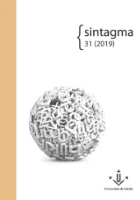
Sintagma
Contributing to the Future of Language Studies.Sintagma is a prominent academic journal dedicated to advancing the field of Linguistics and Language, published by the Universitat de Lleida in Spain. With an ISSN of 0214-9141 and an E-ISSN of 2013-6455, this journal has established itself as an open-access platform since 1989, thereby ensuring wide accessibility and dissemination of research. The journal's commitment to quality is reflected in its ranking within the Q4 quartile of Linguistics and Language in 2021 and a similar standing in Social Sciences and Arts and Humanities, which underscores its emerging importance in these fields despite recent challenges. Covering topics that span theoretical inquiries to applied linguistic studies, Sintagma invites researchers, professionals, and students to contribute to and engage with its evolving landscape from its unique academic perspective. With the convergence of research years from 2011 to 2018 and upcoming issues through 2024, the journal remains poised to provide insightful content that addresses the linguistic dimensions of contemporary society.

Cadernos de Estudos Linguisticos
Exploring the nuances of language for a global audience.Cadernos de Estudos Linguisticos, published by UNIV ESTADUAL CAMPINAS, INST ESTUDOS LINGUAGEM, stands as a pivotal platform in the field of linguistic studies since its inception in 1978. With its commitment to Open Access, this journal fosters the dissemination of cutting-edge research, ensuring that knowledge is accessible to a global audience. This also enhances collaboration among researchers, professionals, and students dedicated to exploring the nuances of language. The journal proudly carries the ISSN 0102-5767 and E-ISSN 2447-0686, attesting to its uninterrupted quality and relevance in linguistic scholarship. By addressing various facets of language studies, including syntax, semantics, and sociolinguistics, this esteemed journal is a vital resource for advancing understanding and innovation in the field.
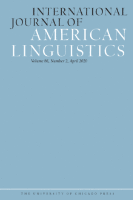
INTERNATIONAL JOURNAL OF AMERICAN LINGUISTICS
Delving Deep into Linguistic Structures and Nuances.The INTERNATIONAL JOURNAL OF AMERICAN LINGUISTICS, published by University of Chicago Press, is a revered scholarly publication dedicated to the exploration and advancement of linguistic studies, particularly those related to the American linguistic landscape. With an ISSN of 0020-7071 and an E-ISSN of 1545-7001, this journal serves as a vital platform for researchers, professionals, and students interested in the nuances of language, dialects, and linguistic structures through rigorous academic inquiry. The journal has established a commendable impact, reflected in its ranking within the Q2 category in Linguistics and Language and its placements in the Scopus rankings, thereby positioning itself within the 50th to 53rd percentile of its respective fields. While the journal does not provide Open Access options, it continues to be a cornerstone resource for those seeking to expand their understanding of American linguistics, already converging from 1996 to 2024. Through its continued commitment to excellence, this publication remains essential for those aiming to contribute significantly to the field.